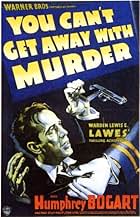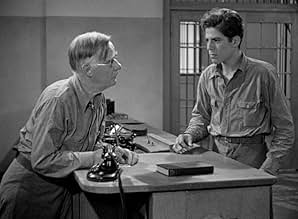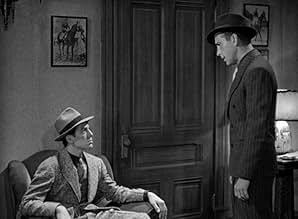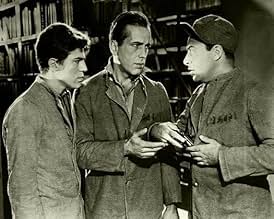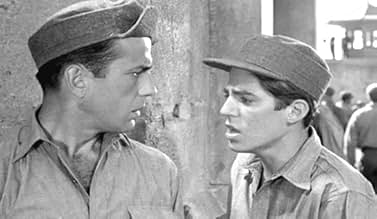Der jugendliche, harte Johnnie Stone ist dem Einfluss des Kleinkriminellen Frank Wilson erlegen, der ihn in einen Raubüberfall und Mord verwickelt, bei dem er die gestohlene Waffe des Freund... Alles lesenDer jugendliche, harte Johnnie Stone ist dem Einfluss des Kleinkriminellen Frank Wilson erlegen, der ihn in einen Raubüberfall und Mord verwickelt, bei dem er die gestohlene Waffe des Freundes seiner Schwester verwendet.Der jugendliche, harte Johnnie Stone ist dem Einfluss des Kleinkriminellen Frank Wilson erlegen, der ihn in einen Raubüberfall und Mord verwickelt, bei dem er die gestohlene Waffe des Freundes seiner Schwester verwendet.
- Principal Keeper
- (as Joseph King)
- Sam
- (Nicht genannt)
- Tourist on Boat
- (Nicht genannt)
- Billiards Observer
- (Nicht genannt)
- Billard Player
- (Nicht genannt)
Empfohlene Bewertungen
From the peak of classic pre-war Hollywood and "Gone with the Wind," anticipating the equally classic and more slick "Citizen Kane" and "Casablanca" in the next three years. And just before star Humphrey Bogart has his breakout in "The Maltese Falcon" in 1941. Things hang a little undecided here, a classic crime drama a removed from the early 30s Warner Bros. masterpieces, but unpolished for its time, too. Blame a modest budget.
But then again, this is rather good on its own terms, a standard gangster story with a message. And Bogart is strong, a bit more developed than his earlier gangster roles where he's a bit of stereotype. Bits of dry humor and disdain creep in, welcome Bogart touches. The main twist here is a sweet young man, really just a kid, gets involved. And how. Note the title.
The writing isn't always great, sometimes falling into cheap dramatic comments without surprise, or even avoiding basic believability. The action parts are good and well filmed (and they avoid unnecessary dialog). Some of the side characters are just filling roles without depth, or are clichés (the African-American reading the cookbook— charming and fun, or the good-hearted librarian in prison). Even the kid isn't quite right, as if he's playing what he thinks he should instead of inhabiting the role.
Bogart, however, is a whole different class of actor in all of this, and he's the reason to watch. The last twenty minutes click along really nicely. Not an awful film in all, but be prepared for some routine stuff between the highlights.
Bogart is fine in a role he could play in his sleep but he doesn't get as much to do as Halop, who WB clearly had high hopes for. Halop is alright when he's playing to his Dead End Kids persona but when he gets melodramatic, the result is over the top. Great character actors like Henry Travers, Harold Huber, John Litel, Joseph Crehan, and Joe Sawyer add color to the cast and liven things up. Travers is especially good. Lovely Gale Page plays Halop's sister and gives a sympathetic turn. It's not one of the better examples from this genre but I doubt many fans will complain about it or feel like it's time wasted.
"You Can't Get Away with Murder" isn't considered part of the "Dead End" series of films, but follows similar story situations and could easily be considered one of the early, more dramatic entries from Warner Bros. Much of the personnel are the same, although it stars only one "Dead End Kid" (Halop). Before becoming a major star, Halop's "boyfriend" Bogart was a regular. Some of these were excellent, and some were poor; repetitive but enjoyable, this one is somewhere in the middle. There are some familiar faces among the studio stock players, with an especially nice role for Henry Travers (as Pop).
****** You Can't Get Away with Murder (3/24/39) Lewis Seiler ~ Billy Halop, Humphrey Bogart, Gale Page, Henry Travers
It is, however, a tense one with good performances. Bogart plays the meaner than dirt Frank Wilson, a criminal who takes advantage of the young, trusting Johnny Stone (Halop), a basically good kid being raised by his sister Madge. She becomes engaged to Fred, a cop who is being transferred to a better job in Boston. He plans on marrying Madge and bringing Johnny with them to Boston, where he's lined up work for him. But when a botched robbery leads to Frank committing murder, he frames Fred for it. Fred winds up on death row while Johnny and Frank serve sentences for another crime. Frank is afraid Johnny will rat him out in order to save Fred.
Bogart does a great job as Frank - he's easy to hate. Billy Halop for me was a bit overdone as Johnny, but he really kept you guessing as to what he would do. Halop was one of the Dead End Kids who sought a career on his own. He was mainly in B movies and finally in small parts, eventually seguing into television. He also worked as a salesman and, at the end of his life, a male nurse. Beset with marital, alcohol, and financial problems, he died at the age of 56.
It's impressive to look at Bogart's pre-stardom career and see how long it took him to break away from the pack - 11 years and 42 films. Well, he was certainly worth waiting for.
Billy Halop of the Dead End Kids is the real star of this film, made two years before Bogart became a true star at Warner Brothers, but this time Halop is minus the other Dead Enders. Here he plays John Stone, a kid from Hell's Kitchen who idolizes small-time gangster Frank Wilson (Humphrey Bogart). John is troubled because it has always been himself and his sister alone against the world, and now big sister is seriously dating cop Fred Burke (Harvey Stephens). John feels replaced by Burke and also resents the guy trying to be a substitute big brother to him.
Frank and Johnny pull off one gas station robbery without a hitch, giving Johnny a taste for more, but the second robbery does not go so well, with Frank killing a pawn shop owner. The problem is that the gun left at the scene was stolen from Burke, is easily traced back to him, and soon Burke is sitting in the death house for a crime committed by Frank and Johnny. In the meantime, Frank and Johnny are picked up and sent to prison for a short stretch (3 years) for their first robbery. In spite of his rough exterior Johnny really has a conscience, and it's working on overdrive with Burke sitting in the same prison as Johnny, except Burke is awaiting execution, not parole. Time is counting down to both Burke's execution and the end of Johnny's sanity. Frank has no problem having someone else fry for his crime, but he can see Johnny is cracking up and he has to come up with some way to keep the kid quiet.
Henry Travers has a supporting yet significant part as the prison librarian - Pop - in a role that seems to be a warm-up for playing Clarence in "It's a Wonderful Life". He plays probably the only true father figure Johnny has ever had. Eddie Rochester Anderson of Jack Benny Show fame lightens the film just a bit as an inmate who comes to the library each day just to read cookbooks aloud.
As for Bogart, he's at his nastiest here without a shred of humanity. As Pop says, "He's the kind of guy who's so crooked if he tried to go straight he'd crack".
Wusstest du schon
- WissenswertesIn Zwölf Monate Bewährungsfrist (1939), Humphrey Bogart and Lee Patrick are seen leaving a theater showing this movie.
- PatzerWhen Frank returns to his apartment after the pawn shop robbery, a moving shadow of the boom microphone is briefly visible on the door frame above his head.
- Zitate
Frank Wilson: Maybe this'll help you out. There's only two guys know who did the shootin' and one of them's dead, and the other one's gonna be if he don't keep his trap shut...
[Pointedly]
Frank Wilson: Good night, Johnny!
- VerbindungenReferenced in Zwölf Monate Bewährungsfrist (1939)
Top-Auswahl
- How long is You Can't Get Away with Murder?Powered by Alexa
Details
- Laufzeit1 Stunde 19 Minuten
- Farbe
- Sound-Mix
- Seitenverhältnis
- 1.37 : 1

